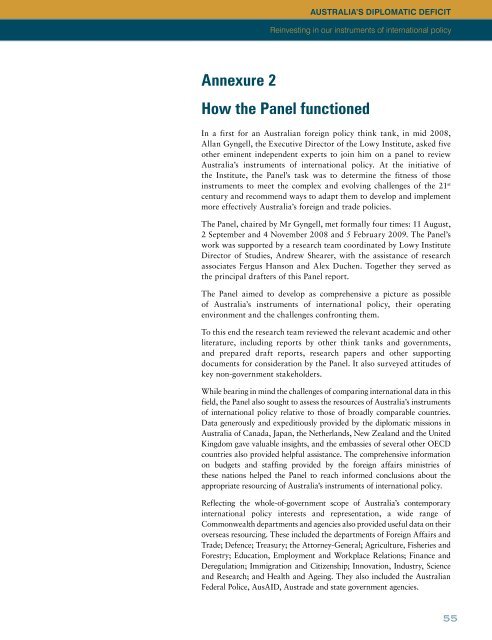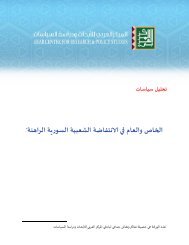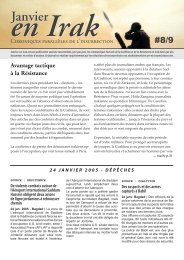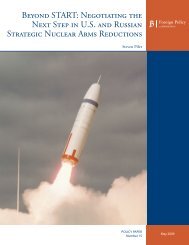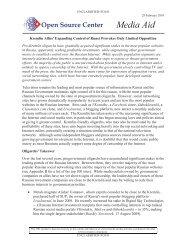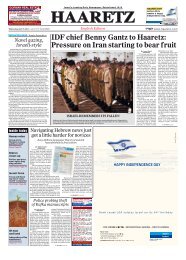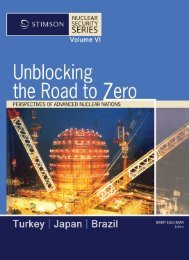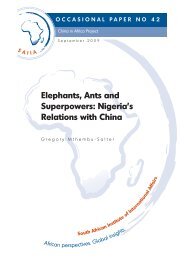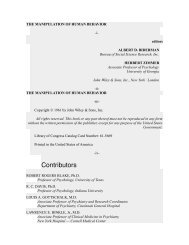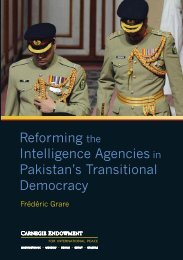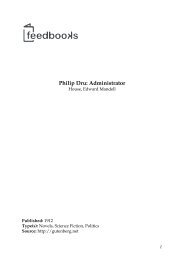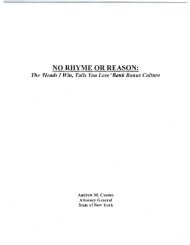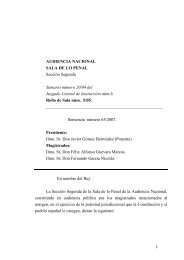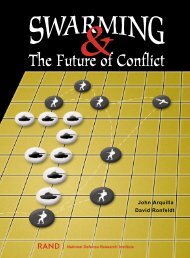Download PDF - Lowy Institute for International Policy
Download PDF - Lowy Institute for International Policy
Download PDF - Lowy Institute for International Policy
You also want an ePaper? Increase the reach of your titles
YUMPU automatically turns print PDFs into web optimized ePapers that Google loves.
AUSTRALIA’S DIPLOMATIC DEFICIT<br />
Reinvesting in our instruments of international policy<br />
Annexure 2<br />
How the Panel functioned<br />
In a first <strong>for</strong> an Australian <strong>for</strong>eign policy think tank, in mid 2008,<br />
Allan Gyngell, the Executive Director of the <strong>Lowy</strong> <strong>Institute</strong>, asked five<br />
other eminent independent experts to join him on a panel to review<br />
Australia’s instruments of international policy. At the initiative of<br />
the <strong>Institute</strong>, the Panel’s task was to determine the fitness of those<br />
instruments to meet the complex and evolving challenges of the 21 st<br />
century and recommend ways to adapt them to develop and implement<br />
more effectively Australia’s <strong>for</strong>eign and trade policies.<br />
The Panel, chaired by Mr Gyngell, met <strong>for</strong>mally four times: 11 August,<br />
2 September and 4 November 2008 and 5 February 2009. The Panel’s<br />
work was supported by a research team coordinated by <strong>Lowy</strong> <strong>Institute</strong><br />
Director of Studies, Andrew Shearer, with the assistance of research<br />
associates Fergus Hanson and Alex Duchen. Together they served as<br />
the principal drafters of this Panel report.<br />
The Panel aimed to develop as comprehensive a picture as possible<br />
of Australia’s instruments of international policy, their operating<br />
environment and the challenges confronting them.<br />
To this end the research team reviewed the relevant academic and other<br />
literature, including reports by other think tanks and governments,<br />
and prepared draft reports, research papers and other supporting<br />
documents <strong>for</strong> consideration by the Panel. It also surveyed attitudes of<br />
key non-government stakeholders.<br />
While bearing in mind the challenges of comparing international data in this<br />
field, the Panel also sought to assess the resources of Australia’s instruments<br />
of international policy relative to those of broadly comparable countries.<br />
Data generously and expeditiously provided by the diplomatic missions in<br />
Australia of Canada, Japan, the Netherlands, New Zealand and the United<br />
Kingdom gave valuable insights, and the embassies of several other OECD<br />
countries also provided helpful assistance. The comprehensive in<strong>for</strong>mation<br />
on budgets and staffing provided by the <strong>for</strong>eign affairs ministries of<br />
these nations helped the Panel to reach in<strong>for</strong>med conclusions about the<br />
appropriate resourcing of Australia’s instruments of international policy.<br />
Reflecting the whole-of-government scope of Australia’s contemporary<br />
international policy interests and representation, a wide range of<br />
Commonwealth departments and agencies also provided useful data on their<br />
overseas resourcing. These included the departments of Foreign Affairs and<br />
Trade; Defence; Treasury; the Attorney-General; Agriculture, Fisheries and<br />
Forestry; Education, Employment and Workplace Relations; Finance and<br />
Deregulation; Immigration and Citizenship; Innovation, Industry, Science<br />
and Research; and Health and Ageing. They also included the Australian<br />
Federal Police, AusAID, Austrade and state government agencies.<br />
55


